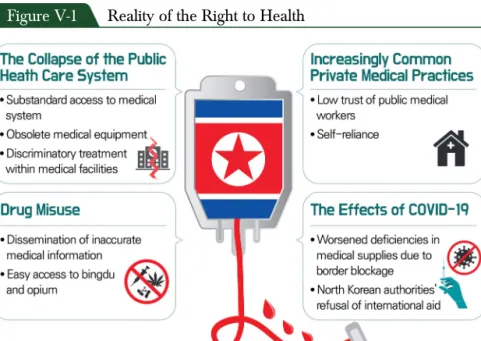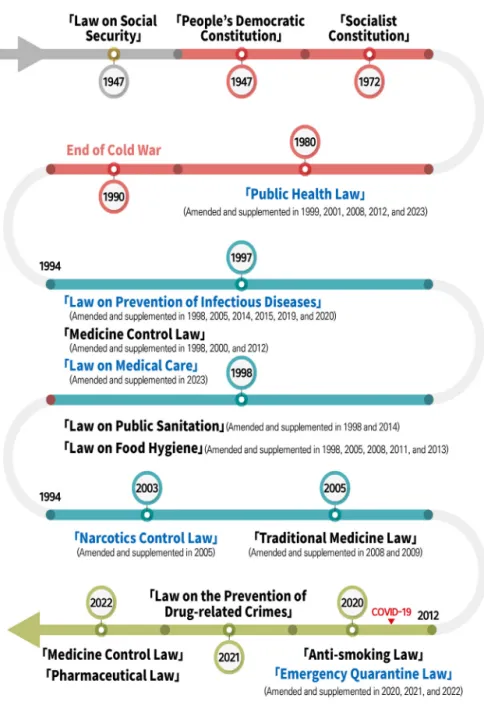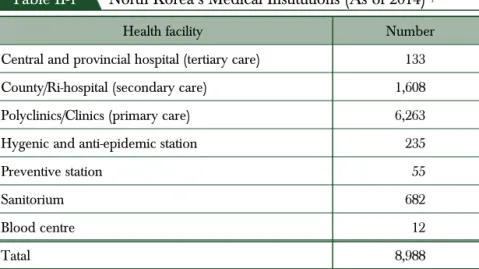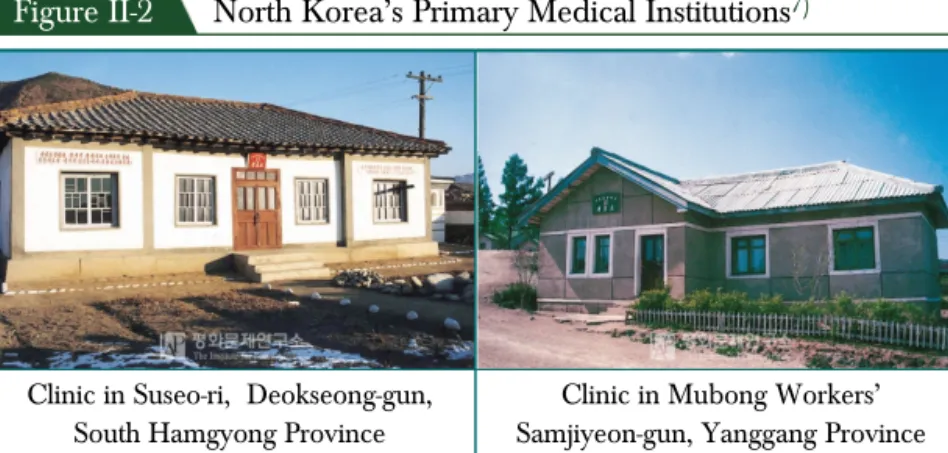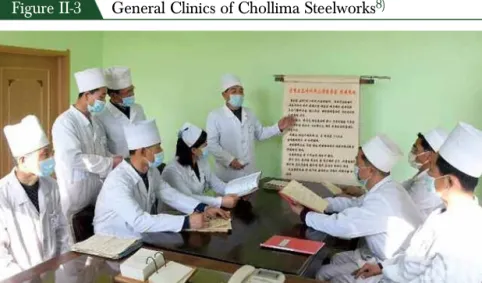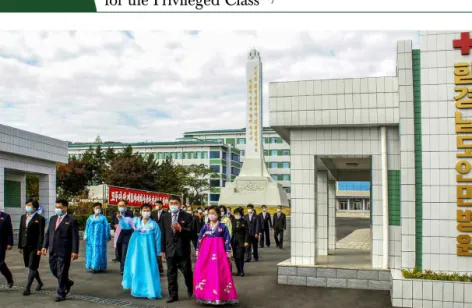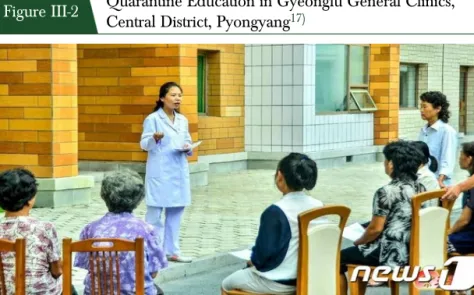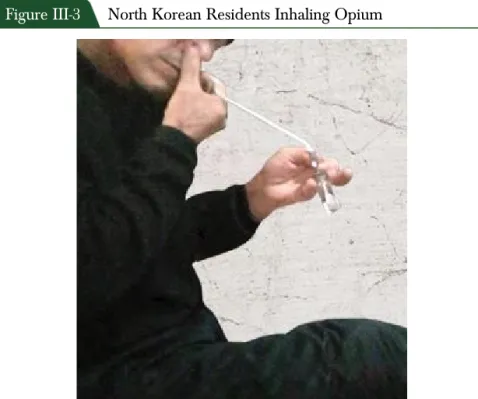The international community, considering the importance of the right to health, has emphasized the rights to life and health. The Socialist Constitution of the Democratic People's Republic of Korea and the Public Health Law define the legal protection of people's right to health in North Korea. As such legislation suggests, North Korea's health care system is largely divided into a system of free medical care, preventive medicine, and the district doctor system, with the aim of guaranteeing the right to health.
Only after the Kim Jong Un era did North Korea strengthen its efforts to ensure the right to health at an institutional level by amending and supplementing health care legislation. As a result, the North Korean people could not enjoy the right to a healthy life. Testimonies from North Korean defectors indicate that the right to health is not adequately guaranteed, although the North Korean regime has.
This paper aims to examine the current status of the North Korean people's right to health in the Kim Jong Un era.
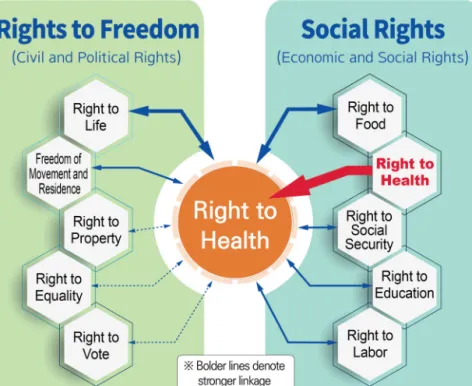
Collapse of the Public Health Care System
One North Korean defector who defected in 2018 testified: "Clinics were in every village, but doctors' skills and medical services were poor." One North Korean defector who defected in 2017 said that when he/she was treated in Pyongyang Medical University Hospital (central hospital) in 2015, he/she paid for medical expenses. Another North Korean defector who defected in 2019 said that patients were told to go buy medicine because the hospital did not have medicine in stock.
Another defector from North Korea, who worked as a dentist until 2018, testified that patients paid $10 for tooth extractions and. Another North Korean defector who defected in the same year testified that when he/she underwent an appendectomy at the OO Hospital located in Hyesan, he/she paid 50 yuan for the operation and paid for all the medicine, heating and food expenses . A North Korean defector who defected in 2018 said that although hospital treatment is free, you have to give cigarettes or.
Another North Korean defector who defected in 2019 testified that provincial-level hospitals are poorly equipped with medical facilities and people are forced to go to hospitals in other provinces and cities or Pyongyang. A North Korean defector who defected in 2019 said you had to pay the surgeon 50 yuan for surgery for appendicitis, a common disease in children, and 100 to 200 yuan for major operations such as enterobrosion. A North Korean defector who defected in 2018 testified that one of his/her neighbors was a breast cancer patient, and that she suffered and died because she could not visit the hospital or take medicine due to economic difficulties.12).
Another North Korean defector who defected in 2019 testified that there are special hospital rooms just for officials in city and provincial hospitals. Another North Korean defector who defected in 2019 said that Party officials who came to the health care wards personally brought high-quality North Korean medicine and received treatment. Access to Medicines and Medical Supplies Medical facilities are dedicated to providing medicines and medical supplies to the people of North Korea.
One North Korean defector who defected in 2019 said that medicine and medical supplies were lacking in hospitals but plentiful in Jangmadang and that mostly cold medicine and digestive medicine were available, while Chinese-made or UN-supplied medicine was plentiful. In contrast, another North Korean defector who defected the same year testified that one can buy medication in Jangmadang, but pharmacies have a larger number of medicines in stock.
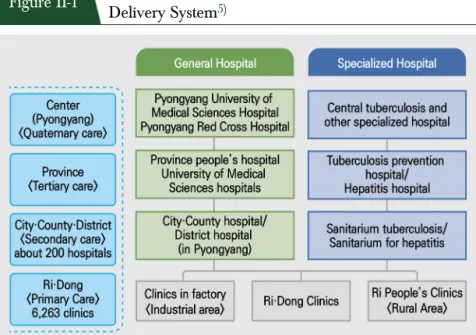
Self-reliance (Charkyok Kaengsaeng) in Health Care Sector
A North Korean defector who defected in 2019 said one of his/her neighbors had been diagnosed with tuberculosis, when in reality the neighbor was suffering from liver disease. A North Korean defector who defected in 2019 said a teenage girl in his/her neighborhood with poor eyesight lost her sight after being misdiagnosed and undergoing treatment and surgery at the city hospital. A North Korean defector who defected in 2019 testified that his/her father ran a private clinic and was so skilled that he sometimes cured diseases that could not be treated even in hospitals.
A North Korean defector who defected in 2019 testified that she went to a maternity hospital around 2015 due to bloody vaginal discharge and was diagnosed. A North Korean defector who defected in 2019 testified that hospital doctors are poorly skilled as nothing is given to them by the state and that many people go to private doctors because they have better skills. One North Korean defector who defected in 2019 testified that his/her father ran a private clinic and cured patients misdiagnosed with incurable diseases by a hospital and that many villagers came to his/her father for medical treatment instead of going to a hospital.
A North Korean defector who defected in 2019 said that he/she made his/her own medicine, such as digestive medicine, and that he/she bought and prescribed his mother musk for her brain hemorrhage. A North Korean defector who defected in 2015 testified that private pharmacies were run by those with money rather than those with expertise. A North Korean defector in his 20s who defected in 2019 testified that his/her father had kidney disease and he used opium once or twice a month when the pain was too severe.
One North Korean defector who defected in 2018 said her spouse suffers from bronchiectasis and uses opium as medicine. One North Korean defector who defected in 2019 testified that her spouse used drugs (bingdu) because her husband showed the symptoms of cerebral thrombosis. A North Korean defector who defected in 2019 testified that North Koreans use drugs (bingdu) as antibiotics and opium as painkillers without thinking that they could be addicted to these drugs.
A North Korean defector who defected in 2017 testified that drivers who often work at night or police officers use drugs (bingdu) as stimulants and that they once saw children doing drugs (bingdu) with their parents. Table III-2 A testimony on opium18). A North Korean defector who defected in 2016 testified that opium was planted without state permission in 2016 and used by the elderly to treat cerebral thrombosis or strokes.
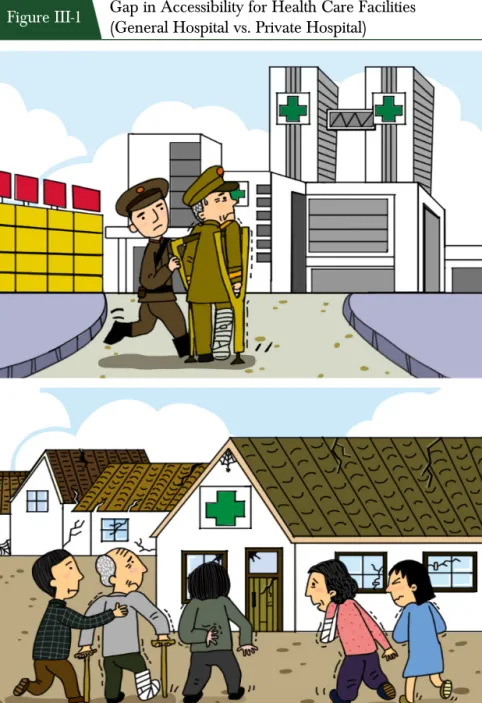
Disaster and North Korean Residents’ Right to Health
North Korea's ability to deal with infectious diseases and social disasters also indicates that the regime has not adequately protected people's right to health and right to life. It also shows that the survival capacity of North Korea's healthcare sector has become increasingly fragile after the COVID-19 pandemic. Article 69, The Emergency Quarantine Law, Collection of Current Laws and Regulations of North Korea 下, (National Intelligence Service, 2022), p.822.
A North Korean defector who defected in 2021 testified that the North Korean regime closed customs and blocked inbound movements in response to the corona virus. He/she heard that the regime imposed strict repression and control to contain the spread of COVID-19, and that all North Korean companies based in China withdrew their operations to North Korea, and that people who had been closely in China, was quarantined for 45 days. One of the most important pillars of North Korea's healthcare system is the preventive medical system.
The risks posed by COVID-19 have prompted North Korea to codify effective countermeasures against infectious diseases in more targeted legislation. Although North Korea imposed strict border closures following the outbreak of COVID-19, it reported confirmed cases of COVID-19 in May. At an emergency quarantine conference on August 10, North Korea announced that the country had won the fight against COVID-19 through quarantine.
The real health care situation in North Korea shows that there is a possibility of a second and third wave of COVID-19 spreading. One North Korean defector, who once worked as a nurse, said patients with COVID-19 had long predated the regime's official announcement. Despite this reality, the North Korean regime has steadfastly refused outside aid in response to COVID-19.
This actually hints at the possibility of further spread of the virus in North Korea. It appears that vaccination of young children went relatively well in North Korea before the COVID-19 pandemic broke out.
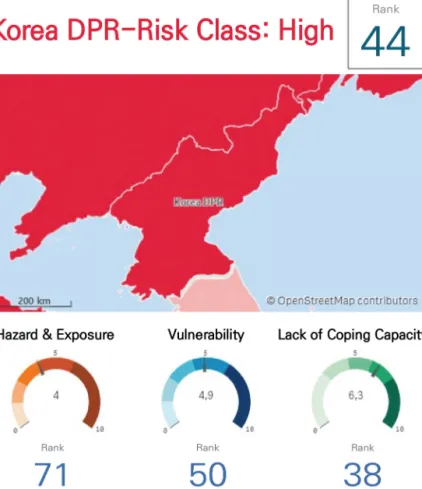
Conclusion
One of the essential elements of the right to health is easy access to public healthcare facilities and services. The physical accessibility of medical care facilities in North Korea appears to be relatively healthy when health care facilities and services are considered. Although the number of clinics at the neighborhood (dong) and rural village (ri) level, which are the primary care providers in North Korea, is relatively low, they are usually located in regions that allow easy access for residents.
Although the North Korean regime claims to provide free medical treatment, in reality it is economic status that determines who gets access to the medical facilities. In other words, a gap has emerged in the quality of medical services depending on a person's financial power. Lack of support for medical institutions and insufficient rewards for medical personnel have forced North Korean residents to pay their own medical expenses.
Because of this, North Korean people often rely on private doctors for medical services due to their relatively lower economic burden compared to hospitals. Residents of North Korea also prefer private doctors over hospital doctors because they do not trust the public healthcare system due to a fundamental lack of skills of medical personnel and poor quality medical equipment. As such, distrust in the public healthcare system has driven residents to resort to so-called “self-reliance” or “self-help” (Charkyok Kaengsaeng), characterized by a dependence on private medical services.
Another serious issue is that North Korean residents abuse drugs, such as bingdu (crystal meth) and opium, due to improper medical knowledge. Although the North Korean regime has enacted legislation providing strong penalties for the drug use that has deeply infiltrated North Korean society, drug use has become even more common as misinformation has spread that narcotics (bingdu) and opium are effective for the treatment of illnesses. The effect of COVID-19 on North Korea is far-reaching, encompassing politics, society and culture, but its effect on the right to health is particularly significant.
